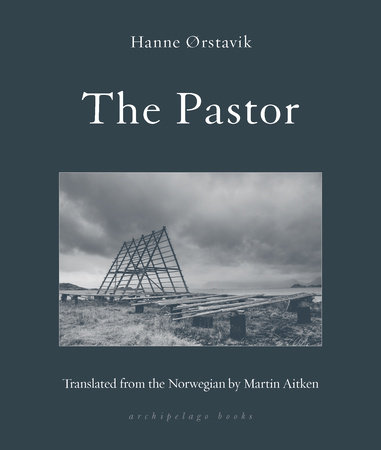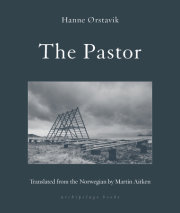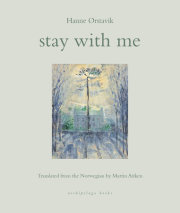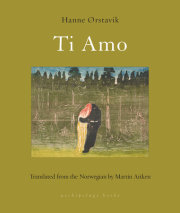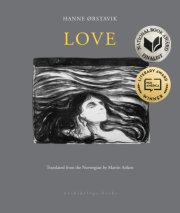This is the blood of Christ.
I stepped sideways again and poured wine into the next
shiny little communion cup. I looked at the bowed heads in
front of me, a row of heads, one after another. It was all just
the way it was supposed to be, I thought to myself. To this
place you may come, and be as one. Here you are chosen, special.
You shall not be overlooked, but may dwell here. You, that
was me too. We.
The altar rail was a beginning. Its semicircle was a sign that
said it was a part of something larger, a circle. And enclosing
that circle was another circle, which in turn was enclosed by
another, larger still, a great, gleaming space, vast and infinite.
It said too that we could be together here, every one of us.
Here. Here you may dwell. This place is for you.
There was a silence. It seemed as if they were fanned out in
front of me, as if a line went from each of their spines, stretching
out into a landscape, out into the open expanse, out over
the fells, out over the sea and onwards, into infinity. They had
taken that landscape inside with them. Soon they would rise,
would push open the doors and go out into it again, and
disperse.
These people, kneeling. As if to say: we tolerate you, despite
everything. Perhaps they’d even forgotten. I could have gone
somewhere else, somewhere other than here, only I knew
something would have happend there too. Not the same thing
again, but something else I couldn’t prevent. Something inevitable
from which subsequently I would have been unable to
hide. Something that could be seen in my face.
It was last year, my first service here. I’d stood at the pulpit
looking out upon them, the congregation waiting to hear
what the new pastor had to say. My sermon was about the
prodigal son: his returning home, his father who slaughtered
the fatted calf in celebration, his brother’s envy, the festivities
they held. I stood in my vestments, the soft-hued stole draped
over my shoulders, the one Kristiane had made for me. I
looked out upon them, willing them to listen, to really listen,
to open themselves to what I was saying, and understand. It
was how I wanted the church to be. A place in which a person
returning home could be received with joy and festivity. I saw
it as my task to ensure the church remained a place of welcome,
so that anyone who wanted could come inside, to join
not with me but with the community, and find quietude there.
A place that would celebrate them. A place in which they
would feel themselves accepted.
That was what I talked about. On and on I went. I didn’t
feel like I was saying things properly. I had to say them again,
over and over again. Rambling on. In my soft vestments, holding
forth. For nearly a whole hour I went on. It had been
impressed upon us during the practicum that the sermon
should not exceed a quarter of an hour. No longer, preferably
not even as long as that. For it’s not the words they remember.
Well, a few words perhaps, a turn of phrase they happen to
find useful, something that seems meaningful to them at that
particular moment in time. But on the whole, they won’t
remember what you’ve said, only the experience of it. So give
them an experience. Do it in fifteen minutes. And never more
than twenty, because then their minds will wander.
And it was true. I’d gone on far too long, and I knew it. But
it was done, and there was nothing I could do to alter it.
People got up and left. Even the woman from the parish
office did, the woman who’d met me on my arrival and given
me the key to the house, who’d shown me around on my first
day and made me coffee in the office. She stuck it out for a
while, but eventually even she had to get up and leave. And
others who I didn’t know yet, they too got to their feet and
walked quietly out through the door. Five or six in all. There
weren’t very many to begin with either.
I woke up thinking about it every now and then, which
made me even more ashamed, to be thinking about that
instead of something else that was more important. But I so
much wanted to get through to them. I had come to them,
with all my bags and boxes, my carful of belongings, had
driven up only a week after Kristiane’s funeral.
I’d found the vacancy on the internet, assistant to the parish
priest, phoned and then faxed them my documents. The
position had been advertised several times, only no one had
applied. A few days later it was all agreed. I packed and set off.
All the way from the south of Germany I came, all the way up
here, to this place in the far north.
It took a day and a night to drive through the pine forests of
northern Finland before reaching the border. I followed the
river, crossed over the fells and came to the fjord on the other
side. And as I meandered through the curves of the road, the
road that hugged the shore on its way towards the town, I had
the feeling that I was coming home. Even though I’d never
been here before. Here, in this landscape, the wide open landscape
that I’d thought about and imagined, was my home.
That was what I felt. I wanted it.
And that was the reason for my sermon, the reason for all
my many words about coming home. I so much wanted my
story to be ours, to share my experience, to give something of
myself, establish some common ground. I wanted, wanted it
so very much. To come to a place and be able to say we, a place
where that was even possible.
But then I ruined it. Even before it started, I ruined it.
Ruined what I wanted and wished for most of all. Time and
again this was what happened. It seeped from inside me, whatever
it was that made me ruin things, leaking out and messing
everything up, consuming everyone as it went.
When I got home from the church that day I hung Kristiane’s
stole away at the back of the wardrobe. I never wore it
again.
And that night he was betrayed. I stood there looking down
on them, hearing my voice in the echoing church. It didn’t
sound like it belonged to me there. I spoke not for my own
sake, but for mine and theirs together: for us.
This is the body of Christ. This is the blood of Christ. Thy
sins are forgiven. Go, and sin no more.
I held out my hands. It felt like I was letting go of something,
as if something departed from me as I opened my arms
and held out my hands. As if by that gesture something
escaped me and was gone.
That was what the year had been like. Everything escaped
me. Every time I held out my hands, something escaped me
and was gone.
Or rather, not everything. It was true that something did,
but somewhere inside me it felt like there was still a place that
could not be entirely depleted, a kind of subterranean spring
that continued to bubble.
Where does it come from? Trickling forth, percolating.
There, persistent and enduring.
I stood in front of the altar as we sang the hymn. And there
was a peace in singing the words, a respite. Soon it would be
Easter, a year since it happened.
Yes, coming here had to do with Kristiane as well, it had
been a reaction of sorts, an action in reverse. In a way, it had
been inevitable, I could just as well have been a piece in some
board game: there I was, at the bottom of the map, southern
Germany, only then I had to be moved, all the way up here.
Action and reaction. As if I’d been slung too close to something,
too far down, too far in, and had to be propelled back
again in the opposite direction. Towards what? Towards
nothing?
Copyright © 2021 by Hanne Ørstavik. All rights reserved. No part of this excerpt may be reproduced or reprinted without permission in writing from the publisher.

